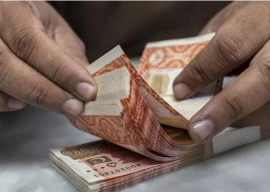
As a result of the chronic energy crisis in the country, many firms in the textile export hub of Faisalabad have begun moving out of the export market and focusing on domestic retail consumers, with many others branching out of textiles altogether into real estate and other segments that serve Pakistan’s growing middle class.
The shortage of gas and electricity has forced many textile firms to shut down their export operations since they cannot compete with global rivals situated in countries like China – which has a much better infrastructure – or Vietnam and Bangladesh, which have lower input costs.
“There is no more international demand for Pakistani products because industrialists have not been able to deliver on previous orders,” said Umar Nazer Shah, who owns Hassan Textile Mills. “The massive cuts in electricity and gas supplies have led many companies to miss their order deadlines.”
The international textile market is brutally competitive. Companies that miss a deadline can find themselves facing cancelled contracts and difficulty getting new orders, since many European and North American retailers work on a “just in time” basis, meaning that they need orders delivered by a very specific date. Failure to do so by a supplier jeopardises their business model and is unacceptable to them.
In addition, Pakistani manufacturers find it difficult to raise prices in line with their own domestic cost of doing business since a European retailer can just as easily get their products manufactured in Vietnam or Bangladesh as in Pakistan. With the expiration of the Multi-Fibre Agreement in 2005, there are very few geographic restrictions anymore on most developed market importers.
Many textile factories in Faisalabad have shut down. The All Pakistan Textile Mills Association, an industry group and one of the most powerful business lobbies in the country, estimates that as many as 500,000 people have lost their jobs as a result of slower business or shuttered factories caused by the energy crisis.
Yet the owners of textile mills are not sitting idle. Many are beginning to refocus their efforts towards the domestic industry where a large and growing middle class, estimated at 30 million people, is beginning to consume more and more.
“Sitara Textile used to be a huge exporter and now focuses almost exclusively on domestic customers,” said Waseem Latif, the owner of Latif International, a textile export company based in Faisalabad. “Chenab Textile Mills has had its own brand of retail stores – Chen One – for several years now.”
These two are not alone. Several other textile mills have discovered the virtues of the retail market, including Gul Ahmed, whose “Ideas” retail stores now have eleven outlets in Karachi.
The benefits of the local market are many, ranging from a more relaxed timeline with respect to getting orders from factory to the store to a less price-sensitive customer.
“It is extraordinary how, despite complaining incessantly about inflation, most domestic consumers seem to keep buying no matter how much the prices rise,” said one finance professional in Karachi.
But the domestic textile market is not the only avenue being pursued by the owners of textile mills. Some have branched out into other industries altogether, with real estate being a particular favourite.
“Kohinoor Textile Mill now runs Kohinoor Malls and builds residential housing,” said Latif, who also pointed to Amtex, which had its initial public offering on the Karachi Stock Exchange in April last year, and has now started developing residential estates in Faisalabad.
Published in The Express Tribune, July 25th, 2011.
COMMENTS (1)
Comments are moderated and generally will be posted if they are on-topic and not abusive.
For more information, please see our Comments FAQ




1727911561-0/Untitled-design-(37)1727911561-0-165x106.webp)












Pakistan draws most of the exports from textile sector. Its too lucrative to lose on !! It's very sad to learn how badly power outages is doing harm to our country.